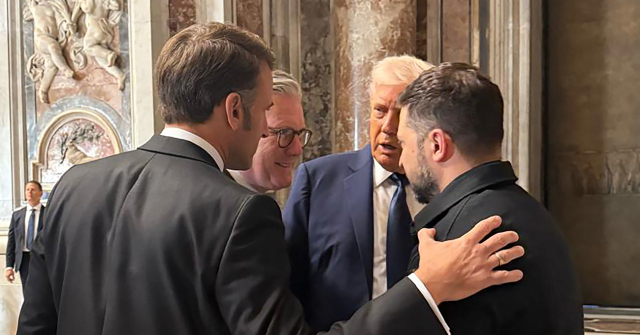During a private video conference with European leaders on Monday, Donald Trump reportedly acknowledged for the first time that Russian President Vladimir Putin “is not ready to stop the war” in Ukraine because “he believes he is winning.” This candid admission surprised European leaders, who had suspected this for a while but had never heard it explicitly stated by the U.S. president.
Revealed by the Wall Street Journal, this change in tone did not translate into a new strategy. Rather than pushing for increased sanctions or pressure, Trump reiterated his preference for low-level negotiations between Russia and Ukraine to take place at the Vatican. “This is not my war. We got involved in something we shouldn’t have,” he commented.
The call featured Ukrainian President Volodymyr Zelensky, French President Emmanuel Macron, German Chancellor Friedrich Merz, Italian Prime Minister Giorgia Meloni, and European Commission President Ursula von der Leyen. The day prior, Trump had another video call where he suggested he might support sanctions against Russia if a ceasefire initiative were unsuccessful.
Kremlin’s Response
In response, the Kremlin stated that the Wall Street Journal report contradicts Moscow’s understanding.
“We know what Trump said to Putin. We do not know what Trump said to the Europeans after the call. We know the official statement from President Trump. What we know contradicts what is written in the article you mentioned,” Kremlin spokesman Dmitry Peskov told reporters.
The Kremlin also addressed the planned prisoner exchange with Ukraine—1,000 from each side—indicating that discussions are ongoing and both sides wish to complete the exchange swiftly. This agreement was reached last week during direct negotiations in Istanbul, marking the first talks since 2022.
From Shift to Reversal
The WSJ reported that Trump’s shift occurred on Monday, as he seemingly stepped back from imposing sanctions. He mentioned support for talks at the Vatican but did not commit to a direct U.S. role.
Zelensky and the European leaders insisted any ceasefire be “unconditional,” but Trump declined to use that term, despite having referenced it publicly just days before.
The potential U.S. delegation may include Secretary of State Marco Rubio and special envoy Keith Kellogg, although Trump appeared hesitant. Talks at the Vatican are expected to be scheduled for mid-June.
The European Bloc and Merz’s New Role
Following Friedrich Merz’s assumption of the Chancellorship in Germany, European pressure on Trump escalated. Merz, unlike his predecessor Olaf Scholz, seems more determined to adopt a firmer stance against Russia. Alongside Macron, Starmer, and Tusk, he made an unannounced visit to Kyiv on May 10, encouraging Zelensky to consider Trump’s initiative to highlight Putin’s obstinacy.
Zelensky’s office subsequently reached out to Trump, offering full backing for a proposed 30-day ceasefire. In turn, Putin suggested direct talks with Ukraine, which took place at a low level in Istanbul—without his presence and yielded no results.
Sanctions and Europe’s Plan B
European leaders had hoped that Trump’s video call would culminate in support for sanctions targeting Russian energy exports and banking operations. Even Senator Lindsey Graham claimed to have garnered 81 congressional supporters for a robust sanctions package. However, those expectations quickly faded.
Facing U.S. hesitance to act immediately, European leaders now believe that support for Ukraine—both military and economic—needs to come primarily from their own resources. Diplomatic sources indicate that the U.S. will continue arms supplies to Ukraine as long as they are funded by Europe or Ukraine itself.
The Performance and the Domestic Audience
Despite the serious topics at hand, Trump’s comments remained unpredictable. He complimented Merz’s English, stating, “I love it more with the German accent,” while criticizing European immigration policies, prompting a response from Macron: “You can’t insult our nations, Donald.”
While disappointed by the lack of support for sanctions, European leaders acknowledge one key takeaway: Trump now recognizes that Putin does not seek peace. The European bloc is now actively pursuing a realistic path forward through the Vatican discussions, fully aware that the initiative rests in their hands.
Ask me anything
Explore related questions
















